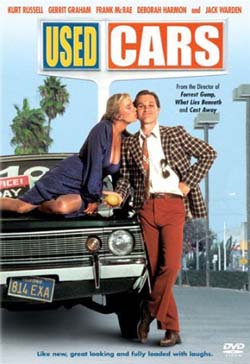
USED CARS
US, 1980, 112 minutes, Colour.
Kurt Russell, Jack Warden, Gerrit Graham, Frank Mc Rae, Deborah Harmon.
Directed by Robert Zemeckis.
Used Cars is an odd film. On the surface it looks like a film pandering to the young American audience - a young hero without scruple trying to exploit his situation in selling bad cars to unwary customers in order to raise money to pay a deposit so that he can be elected to the Senate. Jack Warden appears supporting Kurt Russell as the hero: two brothers - one an old man genuinely trying to sell cars and the other an ambitious go-getter. There is clash between the two car firms. This intrudes into advertising (interrupting such television programmes as important sports fixtures and President Carter's addresses to the nation). There is a huge car procession cum chase at the end with over 200 cars and other vehicles. However, political satire and social satire seems to be always intruding. There is a lot of political and social comment and an amount of black comedy. The end seems bulkily cynical as exploitation wins the day. Whether the film is to be seen merely as entertainment or as a black comedy satirising the political state of America in the '70s is probably debatable.
1. Seventies style entertainment: cars., the road, car sales? The cynical tone? Black comedy? Entertainment value? Message and point? How seriously was the film meant to be taken?
2. The atmosphere of New Mexico - as representing the United States? The old style car lot and the modern pushy style? Sales pitch? Television advertising? The atmosphere of the town, apartments, prison, court rooms? The background of the desert? Authentic atmosphere for this kind of black comedy? The atmosphere of the musical score?
3. Audience response to cars? Machinery, engines, old and new models, redoing cars and selling them? The fascination of the car lot? The examples of selling and pressure? owning cars, identifying with them? The film's capitalising on audience interest? In car sales and the wars amongst dealers?
4. Kurt Russell's style as Rudy? As hero? His sales pitch and push, his relationship with his helpers, his reliance on old Fuchs? His relationship with the girls? The popular image of the American type? His involvement in a battle with Leo Fuchs? The importance of the TV tactics and the interrupting of the programmes? The irony of interrupting the President? The farcical aspects of the advertising and the sensationalism of language and nudity, their being seen on family television? The pathos of old Fuchs' death? His being buried and literally covered up? The arrival of his daughter and Rudy's lies? His relationship with the daughter and her disillusionment with him? The digging up of old Fuchs and his body being in the racing car? The build-up to the expose and trial? The finale with Rudy leading the 200 cars? His switching at the end of the film back to his go-getting self and persuading the girl to join him? Values, the black satire on ordinary values? The irony of Rudy's political ambition and the people supporting him? Comment on American politics - "would you buy a used car from this man?"
5. The sketching in of Rudy's assistants, their help, characters? Work? Old Fuchs' daughter and her background., his fear that she was from Consumer Protection? Her values? Disillusionment with Rudy, trying to manager the sales by herself? The court case and her relying on Rudy?
6. Old Fuchs and his homespun style, his being his own nun, defying his brother, the melodrama of the scare ride and his hear attack, his first burial, his crashing and second death?
7. The contrast with Leo Fuchs and his wealth, push, spying, manipulating the death of his brother, his political links and his bribing, the investigation and antagonism towards Rudy, his tantrums, his advertising and his being mocked by Rudy, his final defiance and comeuppance?
8. The advertisements and the satire on advertising - the interrupting of Carter, the games? The pushiness, sex, explosions? The point of the black humour?
9. The black humour in the death old Fuchs, his first burial, his resurrection for the crash and explosion?
10. The trial and the echoes of the old screwball comedies with their court scenes, the heroine in the dock, the support of the hero, the judge deciding he wanted to see things for himself?
11. The build-up to the finale and the long procession with the 200 cars?
12. How enjoyable an entertainment, a subversion of accepted values? The black comedy and the message? Sincere, cynical?